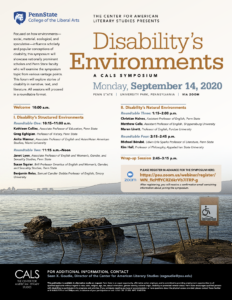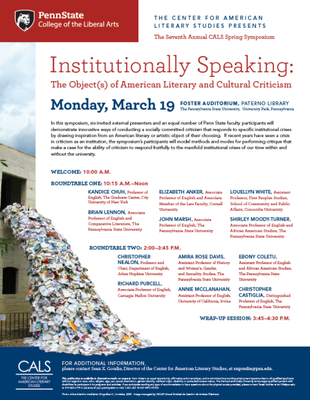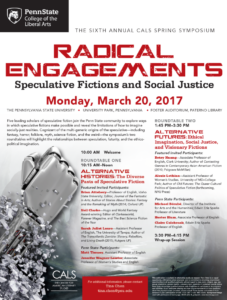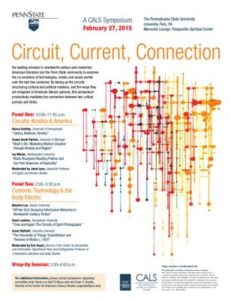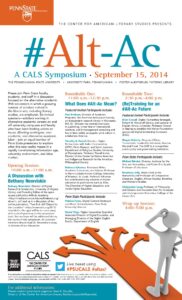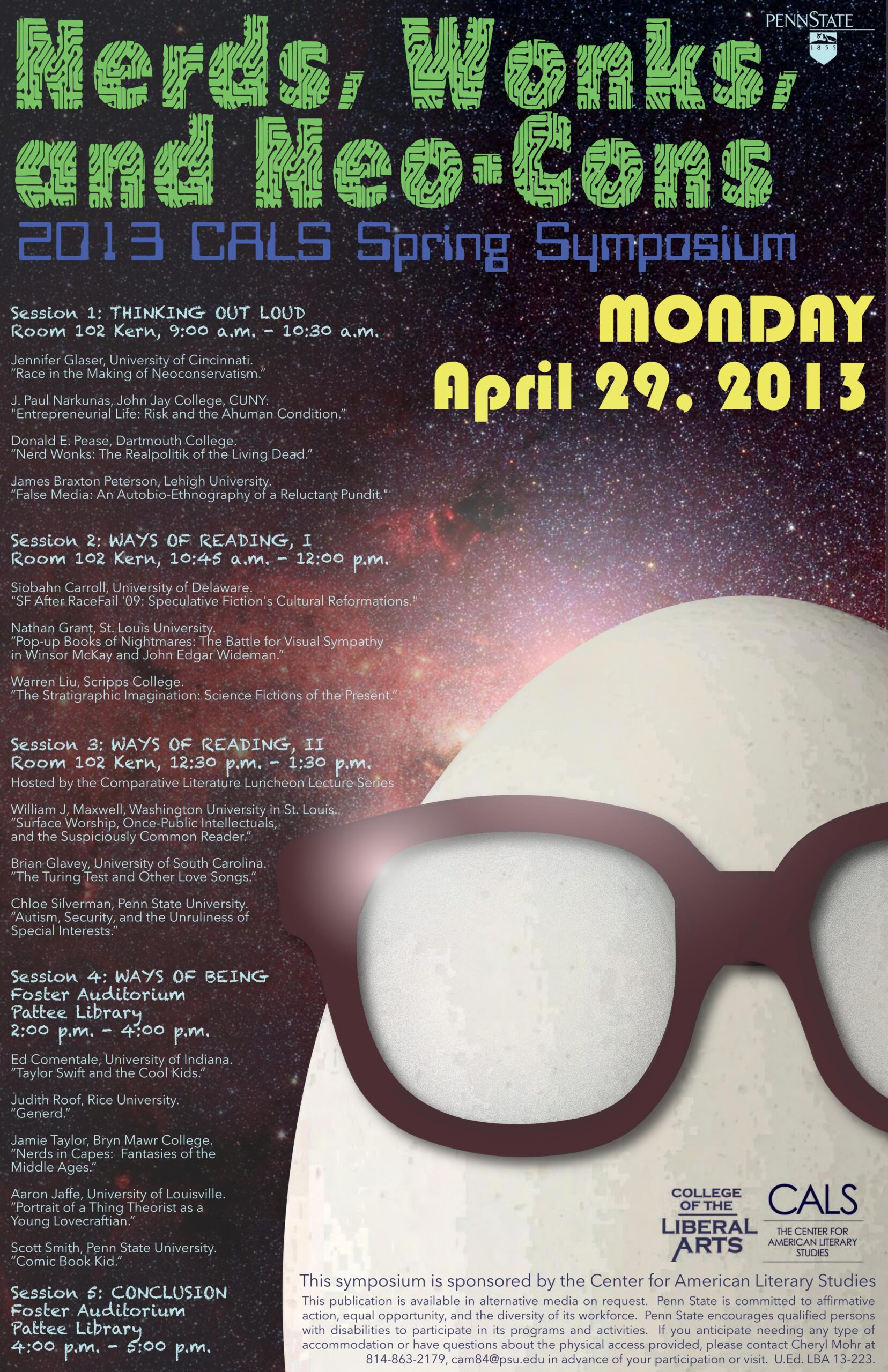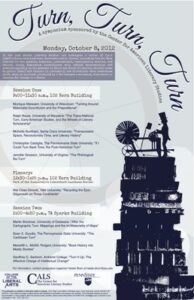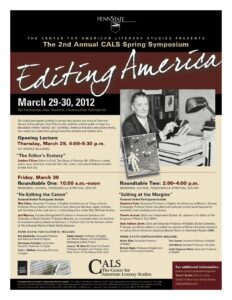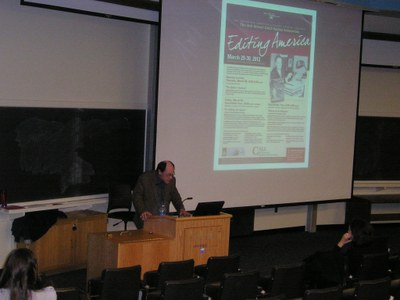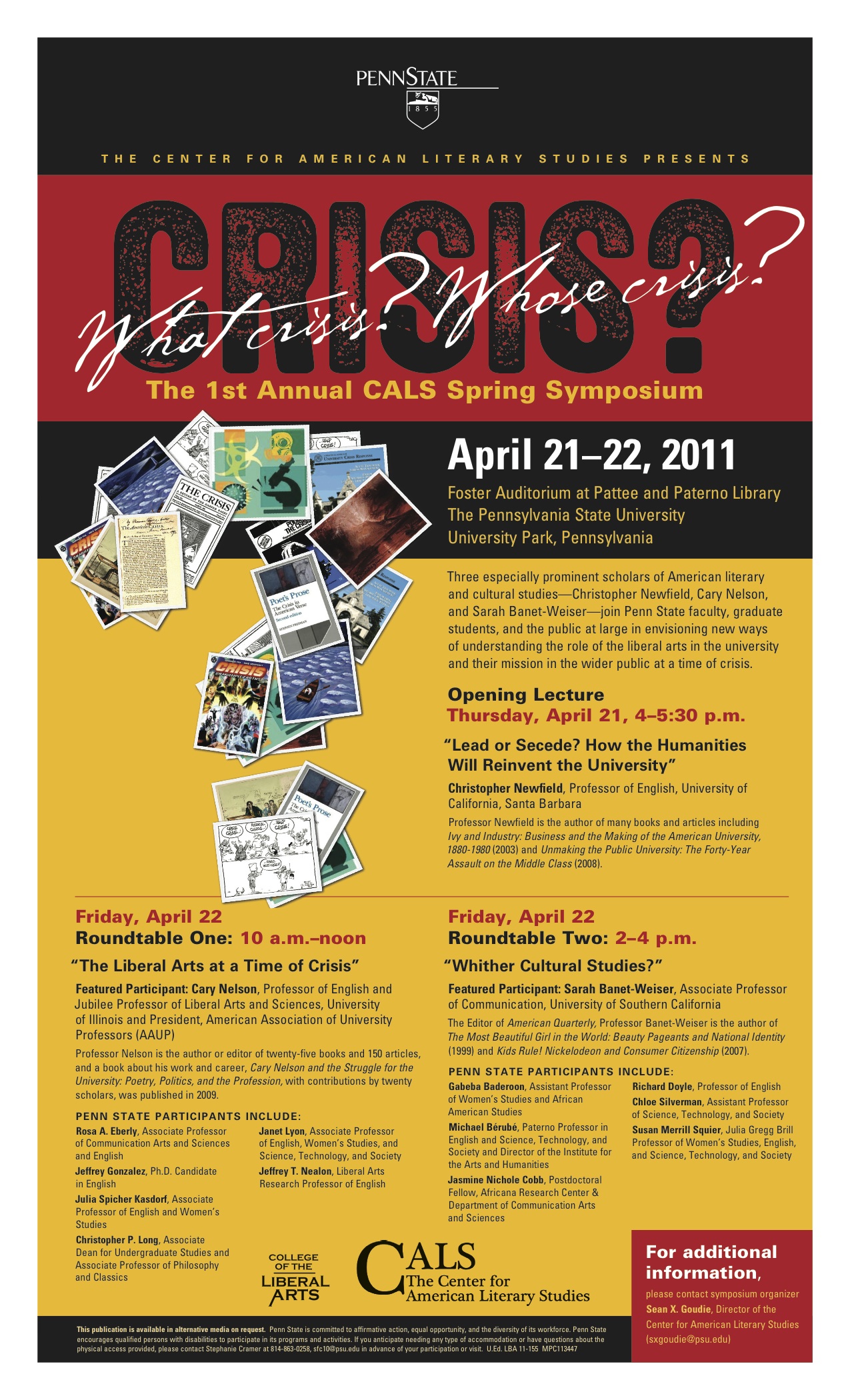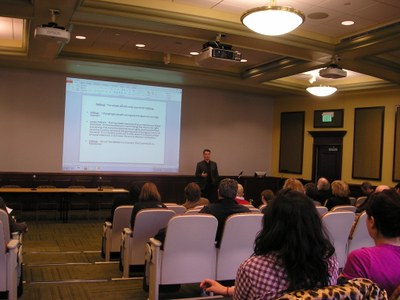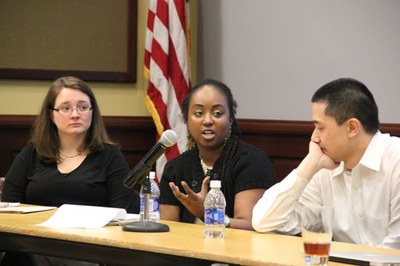Previous Years Symposiums
Spring Symposium 2024 – Field Work: Journal Editors on Shaping Intellectual Life in the Academy
Monday, March 18
3:00-4:45pm
Dewey Room, Collaborative Commons, Pattee Library
This year’s CALS spring symposium focuses on the perhaps underestimated ways in which editors of scholarly journals influence the trajectories of conversations in various literary fields. Five editors or co-editors of academic journals—including three Penn State colleagues and two external invited panelists—will remark upon the manifold ways in which they, and the journals they edit, impact the scholarly landscape. Each panelist will have ten minutes to deliver an opening remark on the symposium topic, to be followed by thirty minutes of Q & A with the audience.
Panelists:
- Nathan Grant, Associate Professor of English, St. Louis University. The author of Masculinist Impulses: Toomer, Hurston, Black Writing, and Modernity, Nathan Grant has served as Editor-in-Chief of African American Review (Johns Hopkins University Press) for over a decade.
- Sarah Chinn, Professor of English, Hunter College. Sarah Chinn is the author of several monographs including most recently the award-winning Spectacular Men: Race, Gender, and Nation on the Early American Stage, 1780-1830. She currently serves as Co-Editor of J19: The Journal of Nineteenth-Century Americanists (Johns Hopkins University Press).
- Janet Lyon, Associate Professor of English and Women’s, Gender, and Sexuality Studies, Penn State. Janet Lyon is Director of the Graduate Program in the Department of English and Faculty-in-Charge of the Disability Studies Minor. Co-Editor of the Journal of Modern Literature (Indiana University Press), she is currently completing a monograph on disability and modernism.
- Benjamin Schreier, Mitrani Family Professor of Jewish Studies and Professor of English, Penn State. Benjamin Schreier is the author of several monographs including most recently The Rise and Fall of Jewish American Literature: Ethnic Studies and the Challenge of Identity. Since 2012, Schreier has served as Editor of Studies in American Jewish Literature (Penn State University Press).
- Tina Chen, Associate Professor of English and Asian American Studies, Penn State. Tina Chen is Director of the Global Asias Initiative and Editor of Verge: Studies in Global Asias (University of Minnesota Press), for which she was named the 2022 recipient of the Distinguished Editor Award from the Council of Editors of Learned Journals (CELJ). Her monograph Alien Form: Global Asias and the Speculative Genres of Academic Labor is forthcoming from Duke University Press.
Moderator:
- Joseph Glinbizzi, Graduate Student, Department of English, Penn State.
For additional information, please contact Sean X. Goudie, director of the Center for American Literary Studies, at sxgoudie@psu.edu.
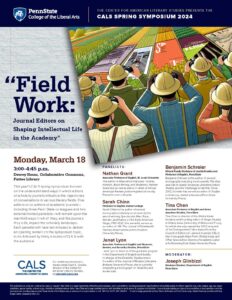
Spring Symposium 2023 – The Genre Boom: Humanities and the Rise of Genre Fiction
The CALS Spring Symposium returns with a panel discussion on “The Genre Boom: Humanities and the Rise of Genre Fiction.”
The last several decades have seen the rise of genre fiction not only in its omnipresence but also in its increasing cultural capital. Literary fiction by writers like Colson Whitehead, Kazuo Ishiguro, and Cormac McCarthy borrow tropes from sci-fi and fantasy fiction, receiving prestigious literary prizes in return. The pulpiest of genres, from hard-boiled detective fiction to harlequin romance, proliferate in number and kind, while migrating across media, reshaping film, television, and video games. This symposium asks how literary, cultural, and media studies have transformed in response to the genre boom and how they might continue to evolve in the future. What might scholars and critics learn from changes in genre fiction and its reception? What concepts or methods are adequate to these ongoing transformations? Does the scholarly turn to genre raise the possibility of new academic institutions, as well as new critical practices?
Panelists:
- Alexis Lothian, Associate Professor of Women, Gender, and Sexuality Studies, University of Maryland. Alexis Lothian is the author of Old Futures: Speculative Fiction and Queer Possibility (NYU Press 2018). She’s currently working on two book projects, one on the politics of fantasy in slash fan fiction and one on the history of social justice discourse in online fan culture.
- Rebekah Sheldon, Associate Professor of English and Director of Cultural Studies, Indiana University. Rebekah Sheldon is the author of The Child to Come: Life After the Human Catastrophe (University of Minnesota Press 2016). Her current research is on new materialism and the occult.
- Jennifer Wagner-Lawlor, Professor of Women’s, Gender, and Sexuality Studies and English, Penn State. Jennifer Wagner-Lawlor has published dozens of articles, and two utopia related books: a monograph, Postmodern Utopias and Feminist Fictions (Cambridge University Press 2013) and The Palgrave Handbook of Utopian and Dystopian Literatures (2022).
- Christian P. Haines, Associate Professor of English, Penn State. Christian Haines is the author of A Desire Called America: Biopolitics, Utopia, and the Literary Commons (Fordham University Press 2019). He’s currently working on two books, one on finance capital and contemporary culture, another on capitalism, ecology, and genre fiction.
Moderator:
- Su Young Lee, Graduate Student, Department of English, Penn State.
Read a recap of the Symposium by CALS Graduate RA Jess Rafalko here.
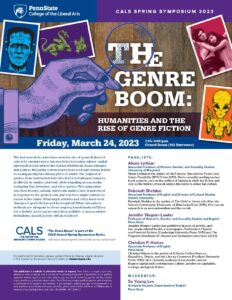
Monday, September 14, 2020***
***Please note that this event was postponed from its original 3/23/20 date and rescheduled for 9/14/2020 due to the COVID-19 pandemic and resulting event cancellations.
The Pennsylvania State University
University Park, Pennsylvania
Via Zoom (View Recording)
Focused on how environments—social, material, ecological, and speculative—influence scholarly and popular conceptions of disability, this year’s spring symposium will showcase nationally prominent scholars alongside Penn State faculty who will examine the symposium topic from various vantage points. This forum will explore stories of disability in narrative, text, and literature.
Welcome: 10:00 AM
I. Disability’s Structured Environments
Roundtable One: 10:15—11:00 AM
- Kathleen Collins, Associate Professor of Education, The Pennsylvania State University
- Greg Eghigian, Professor of History, The Pennsylvania State University
- Anita Mannur, Associate Professor of English and Asian/Asian American Studies, Miami University
Roundtable Two: 11:15 AM—Noon
- Janet Lyon, Associate Professor of English and Women’s, Gender, and Sexuality Studies, The Pennsylvania State University
- Susan Squier, Brill Professor Emeritus of English and Women’s, Gender, and Sexuality Studies, The Pennsylvania State University
- Benjamin Reiss, Samuel Candler Dobbs Professor of English, Emory University
II. Disability’s Natural Environments
Roundtable Three: 1:15—2:00 PM
- Christian Haines, Assistant Professor of English, The Pennsylvania State University
- Matthew Cella, Assistant Professor of English, Shippensburg University
- Maren Linett, Professor of English, Purdue University
Roundtable Four: 2:15—2:45 PM
- Michael Bérubé, Edwin Erle Sparks Professor of English, The Pennsylvania State University
- Kim Hall, Professor of Philosophy, Appalachian State University
Wrap-up Session: 2:45—3:15 PM
Monday, March 25, 2019
The Pennsylvania State University
University Park, Pennsylvania
Foster Auditorium, Paterno Library
Taking our cue from the current moment—where opponents regularly accuse each other of being corrupt, corrupted, and corruptible—and the notion that we may be living in a new Gilded Age, this year’s symposium showcases nationally prominent scholars alongside Penn State faculty and will examine ways in which American literature, culture, and society engage and are engaged in corruption. Read a recap of this event here.
Welcome: 10:00 AM
Roundtable One: The Roots and Routes of Corruption 10:15 AM—Noon
- Leigh Claire La Berge, Assistant Professor of English, Borough of Manhattan Community College (CUNY)
- Gordon Fraser, Senior Visiting Fellow, Center for Humanities and Information, The Pennsylvania State University, and Presidential Academic Fellow, University of Manchester
- Cynthia Young, Associate Professor of African American Studies and English, The Pennsylvania State University
- Jeffrey T. Nealon, Edwin Erle Sparks Professor of English and Philosophy, The Pennsylvania State University
- Nick Mitchell, Assistant Professor of Critical Race and Ethnic Studies and Feminist Studies, University of California, Santa Cruz
- Michael Bérubé, Edwin Erle Sparks Professor of English, The Pennsylvania State University
Roundtable Two: The Art(s) of Corruption 2:00 PM—3:45 PM
- Kyla Wazana Tompkins, Associate Professor of English and Gender and Women’s Studies, Pomona College
- Nicole Seymour, Associate Professor of English, California State University, Fullerton
- Eric Bennett, Associate Professor of English, Providence College
- Julia Kasdorf, Professor of English and Women’s, Gender, and Sexuality Studies, The Pennsylvania State University
- Scott Selisker, Associate Professor of English, University of Arizona
- Rosemary Jolly, Professor of English and Comparative Literature and Weiss Chair of the Humanities, The Pennsylvania State University
Wrap-up Session: 3:45 PM—4:30 PM
For additional information, please contact Sean X. Goudie, Director of the Center for American Literary Studies (sxgoudie@psu.edu )
Monday, March 19, 2018
The Pennsylvania State University
University Park, Pennsylvania
Foster Auditorium, Paterno Library
In this symposium, six invited external presenters and an equal number of Penn State faculty participants will demonstrate innovative ways of conducting a socially committed criticism that responds to specific institutional crises by drawing inspiration from an American literary or artistic object of their choosing. If recent years have seen a crisis in criticism as an institution, the symposium’s participants will model methods and modes for performing critique that make a case for the ability of criticism to respond fruitfully to the manifold institutional crises of our time within and without the university. Read a recap of this event here.
Welcome: 10:00 AM
Roundtable 1: 10:15 AM—Noon
Kandice Chuh, Professor of English, The Graduate Center, City University of New York
Brian Lennon, Associate Professor of English and Comparative Literature, The Pennsylvania State University
Elizabeth Anker, Associate Professor of English and Associate Member of the Law Faculty, Cornell University
John Marsh, Associate Professor of English, The Pennsylvania State University
Louellyn White, Assistant Professor, First Peoples Studies, School of Community and Public Affairs, Concordia University
Shirley Moody-Turner, Associate Professor of English and African American Studies, The Pennsylvania State University
Roundtable 2: 2:00 PM—3:45 PM
Christopher Nealon, Professor and Chair, Department of English, Johns Hopkins University
Richard Purcell, Associate Professor of English, Carnegie Mellon University
Amira Rose Davis, Assistant Professor of History and Women’s, Gender, and Sexuality Studies, The Pennsylvania State University
Annie McClanahan, Assistant Professor of English, University of California, Irvine
Ebony Coletu, Assistant Professor of English and African American Studies, The Pennsylvania State University
Christopher Castiglia, Distinguished Professor of English, The Pennsylvania State University
Wrap-up Session: 3:45 PM—4:30 PM
Monday, March 20, 2017, 10 a.m. to 4:15 p.m.
Foster Auditorium, Paterno Library
Penn State University
Five leading scholars of speculative fiction join the Penn State community to explore ways in which speculative fictions make possible and reveal the limitations of how to imagine socially-just realities. Cognizant of the multi-generic origins of the speculative—including fantasy, horror, folklore, myth, science fiction, and the weird—the symposium’s two roundtables will highlight the relationships between speculation, futurity, and the ethico-political imagination.
Welcome
(10 a.m.)
ROUNDTABLE ONE, Alternative Histories: The Diverse Pasts of Speculative Fiction
(10:15 a.m. – Noon)
Featured Invited Participants:
Brian Attebery, Professor of English, Idaho State University; editor, Journal of the Fantastic in Arts; author of Stories About Stories: Fantasy and the Remaking of Myth (2014; Oxford UP)
- Neil Clarke, Hugo and World Fantasy Award-winning Editor of Clarkesworld, Forever Magazine, and The Best Science Fiction of the Year
- Sarah Juliet Lauro, Assistant Professor of English, The University of Tampa; author of The Transatlantic Zombie: Slavery, Rebellion, and Living Death (2015; Rutgers UP)
PSU Participants:
- Matt Tierney, Assistant Professor of English
- Jennifer Wagner-Lawlor, Associate Professor of Women’s Studies and English
ROUNDTABLE TWO, Alternative Futures: Ethical Imagination, Social Justice, and Visionary Fictions
(1:45 p.m. – 3:30 p.m.)
Featured Invited Participants:
- Betsy Huang, Associate Professor of English, Clarke University; author of Contesting Genres in Contemporary Asian American Fiction (2010; Palgrave McMillan)
- Alexis Lothian, Assistant Professor of Women’s Studies, University of MD-College Park; author of Old Futures: The Queer Cultural Politics of Speculative Fiction (forthcoming, NYU Press)
PSU Participants:
- Michael Bérubé, Director of the Institute for Arts and the Humanities; Edwin Erle Sparks Professor of Literature
- Hester Blum, Associate Professor of English
- Claire Colebrook, Edwin Erle Sparks Professor of English
Wrap-up Session (3:30 p.m. – 4:15 p.m.)
For additional information, please contact Tina Chen.
CALS seeks to encourage, and to provide a vital forum for, new ways of reading and thinking about American literature. Consistent with that emphasis, this symposium brings together five invited participants with Penn State students, faculty, and the public at large to celebrate the many innovative ways individuals, museums, centers, foundations, libraries, blog sites, and other spaces are engaging readers, drawing them together, and making American literature an important public space.
Panel One: 10:00-11:45 a.m.
American Literature as Public Space
Joseph Coulson, Author and President, The Great Books Foundation
Maggie Dietz, Poet, Assistant Professor of English, University of Massachusetts, Lowell, and Director, The Favorite Poem Project
Malcolm E. O’Hagan, Founder and President, The American Writers Museum
Panel Two: 1:30-3:00 p.m.
The Public Spaces of American Literature
Ellis Avery, Author, Assistant Professor of Poetry, Columbia University, and Contributing Editor, Public Books
Paul Lai, Intermittent Librarian, Hennepin County and Ramsey County Libraries (MN), Adjunct Instructor, Information and Media Studies, Minneapolis Community & Technical College, and Co-Editor, Asian American Literature Fans
Susan Russell, Associate Professor of Theatre, Pennsylvania State University Laureate, 2014-2015, and Founder, Cultural Conversations
Closing Roundtable: 3:00-4:00 p.m.
American Literary Publics
Elaine Meder-Wilgus, Owner, Webster’s Bookstore Cafe
William Brockman, Humanities Librarian
Julia Spicher Kasdorf, Professor of English and Women’s Studies
Ebony Coletu, Assistant Professor of English
Jonathan Eburne, Associate Professor of Comparative Literature and English
For additional information, please contact Sean Goudie, symposium organizer and Director of the Center for American Literary Studies.
Feb 27, 2015 from 10:00 AM to 04:00 PM
Memorial Lounge, Pasquerilla Spiritual Center
For an event summary and photos of the “Circuit, Current, Connection” symposium, please click here
Six leading scholars in nineteenth-century and modernist American literature join the Penn State community to examine the co-evolution of technologies, media, and social worlds over the last two centuries. By taking up the circuits structuring cultural and political relations, and the ways they are imagined in American literary spheres, this symposium productively mediates the connection between two critical periods and fields.
PANEL ONE: 10:00-11:45 | CIRCUITS: KINSHIP & AMERICA
Nancy Bentley, “Syntax, Network, Kinship”
Nancy Bentley is Professor of English at the University of Pennsylvania and the author of Frantic Panoramas: American Literature and Mass Culture (2009). Her current book project, New World Kinship and the American Novel, examines the relations among kinship, sovereignty, and secularity in the nineteenth-century United States.
Susan Scott Parrish, “Noah’s Kin: Mediating Modern Disaster through Kinship and Region”
Susan Scott Parrish is an Associate Professor in the English Department, the Program in the Environment, and the Honors Program at the University of Michigan. The author of American Curiosity: Cultures of Natural History in the Colonial British Atlantic World (2006), her research addresses the interrelated issues of race, the environment, and knowledge-making in the Atlantic world from the seventeenth up through the mid-twentieth century.
Ivy Wilson, “Black Bourgeois Reading Publics and the Print Networks of Radicality”
Professor Wilson teaches courses on the comparative literatures of the black diaspora and U.S. literary studies with a particular emphasis on African American culture at Northwestern University. His recent publications include Specters of Democracy: Blackness and the Aesthetics of Politics in the Antebellum U.S. and, with Dana Luciano, Unsettled States: Nineteenth-Century American Literary Studies.
Moderated by Janet Lyon, Associate Professor of English and Women Studies
PANEL TWO: 2:00-3:30 | CURRENTS: TECHNOLOGY & THE BODY ELECTRIC
Maurice Lee, “Off the Grid: Escaping Information Networks in Nineteenth-Century Fiction”
Maurice Lee is Chair and Professor of English at Boston University, where his work focuses on nineteenth-century American literature and culture with special emphases on the intersections of literature, philosophy, and science. He is the author of Uncertain Chances: Science, Skepticism, and Belief in Nineteenth-Century America Literature (2012) and the editor of The Cambridge Companion to Frederick Douglass (2009).
Dana Luciano, “Time and Again: The Circuits of Spirit Photography”
Dana Luciano is Associate Professor of English at Georgetown University and the author of Arranging Grief: Sacred Time and the Body in Nineteenth-Century America (2007). Her recent work includes the essay collection Unsettled States: Nineteenth-Century American Literary Studies (2014) and a forthcoming special issue of GLQ: The Journal of Lesbian and Gay Studies titled “Queer Inhumanisms” (spring/summer 2015).
Grant Wythoff, “The Perversity of Things: Scientifiction and Theories of Media c. 1920.”
Grant Wythoff is a Postdoctoral Fellow in the Society of Fellows in the Humanities and a Lecturer in English at Columbia University interested in the history and theory of media technologies, twentieth century American literature, digital methods, and science fiction. His current projects include a cultural history of the gadget and a critical edition of Hugo Gernsback’s work titled The Perversity of Things: Writings on Media, Tinkering, and Scientifiction, forthcoming from the University of Minnesota Press.
Moderated by Eric Hayot, Director of the Center for Humanities and Information, Department Head and Distinguished Professor of Comparative Literature and Asian Studies
WRAP-UP SESSION: 3:30-4:00
For additional information, please contact symposium organizing committee chair Derek Lee (dpl151@psu.edu) and Sean X. Goudie, Director of the Center for American Literary Studies (sxgoudie@psu.edu).
What is the career path for academics in the humanities who choose not to become professors? What can graduate students do to prepare for a rapidly evolving employment landscape, and just as importantly, how can the university itself change to accommodate these alternate visions of the academy? On Monday, September 15th, CALS hosted the #Alt-Ac Symposium at Foster Auditorium to explore these questions, which touch upon some of the thorniest issues in higher education today. Short for “alternative academic careers,” #Alt-Ac began as a Twitter-inspired neologism for positions that exist within and around the academy but outside the ranks of tenure-track teaching faculty, such as those found in university libraries, writing centers, and research organizations. In many PhD programs—especially in the humanities—any deviation from the graduate student-to-professor trajectory onto such “unconventional” career paths has often been stigmatized. Such a traditional mindset ignores radical changes in academic employment in recent years, however, including the decline in tenure-line appointments, the increase in adjunct faculty, and the creation of digital humanities and technology roles that previously did not exist. To address this sea change in academic employment, CALS Director Sean Goudie invited thought leaders from the #Alt-Ac movement (most of whom earned their doctorates in fields like English, History, and American Studies) and professors for a full-day symposium to reconsider the alternative academy in the twenty-first century university.
Bethany Nowviskie, one of #Alt-Ac’s leading voices, kicked off the event with a brief history of the movement, including its etymological origins as a response to “non-academic” careers, a term that has historically diminished humanities scholars and discouraged graduate students from exploring novel career paths. For Nowviskie, who serves as Director of Digital Research & Scholarship for the University of Virginia Library, the #Alt-Ac label rejects the academic/non-academic binary by creating a space where the entire spectrum of careers in and around the university can be reassessed with an open mind. After her opening remarks, she led a lively Q&A session with the audience, which drew faculty, administrators, students, and staff from across the mid-Atlantic region as far away as North Carolina. While some audience members voiced their hopes for the event and others shared their future vision of the university, all shared in the timeliness and urgency of the symposium.
Given the rapid evolution of the #Alt-Ac label since its inception in 2009, the first panel attempted to answer the complex question of what does #Alt-Ac mean today? For several participants, #Alt-Ac is an umbrella term for a group of professions they find more satisfying than the standard professor role. According to Paul Erickson, there was “nothing alternative” about becoming the Director of Academic Programs at the American Antiquarian Society since this was the exact type of job he wanted when he started his American Studies PhD program. Tim Powell similarly felt that his work as Director of the Center for Native American and Indigenous Research at the American Philosophical Society, which involves working directly with Native American tribes to preserve their culture, has a far greater impact than a traditional teaching appointment. One of the major themes of the conference was the role of technology in the alternative academy. Both Dan Tripp and Patricia Hswe saw their respective digital strategy roles in the Department of English and University Libraries at Penn State as positions that were fundamentally changing the way the academy operates. For many of the invited speakers, #Alt-Ac also represented a necessary culture shift for departments and individuals alike. As Rebecca Schuman, who served as both a symposium panelist and an education columnist covering the event for Slate, summed up, “#Alt-Ac is a state of mind” for recognizing that all jobs, whether academic or non-academic, are worthy of respect.
The second session focused on training graduate students for #Alt-Ac careers. One recurring message among the panelists was the need for students to acquire non-research related skills while still in school. Megan Doherty, a program officer at the German Marshall Fund, described how she gave historical tours and volunteered for several organizations while a History PhD at Columbia, whereas Professor Rosemary Jolly, Weiss Chair in the Humanities at Penn State, had an editing career planned in case her academic job search proved unsuccessful. Other panelists called for the university to do more for graduate students. Brian Croxall, Digital Humanities Strategist and Lecturer of English at Emory University, proposed that graduate students intern at various academic units to understand how a university worked while gaining non-research experience. Associate Dean for Graduate and Undergraduate Education Chris Long elaborated on this idea with the Graduate Internship Program (GRIP) currently in place at Penn State’s College of the Liberal Arts. On the faculty side, Edwin Erle Sparks Professor of Literature Michael Bérubé, who also serves as Director of the Institute for Arts and Humanities at Penn State, highlighted the need for faculty to prioritize the happiness of their graduate students, not all of whom would seek tenure-faculty positions.
In the wrap-up session, Nowviskie emphasized that the most important aspect of the #Alt-Ac symposium was a sense of purpose—the idea that alternative academics like her were laying the foundation for new leaders of the movement to build upon. “This is a generational mission,” she said. For Nowviskie and many of her fellow speakers, the symposium marked the start of the overall academic environment changing for the better, and she encouraged others to join her at the forefront of that change.
Is the modern world run by nerds? Bill Gates is a nerd; Tina Fey is a nerd; Nathan Glazer and Paul Krugman are nerds; Al Gore probably is a nerd.
Washington may be swarming with glad-handing political animals, and Hollywood and Wall Street may be teeming with outsized egos, but their ranks are peopled with number-crunchers, statisticians, legal analysts, and policy wonks. The great irony of David Fincher’s recent film The Social Network (2010) is its attention to the anti-social tics and habits of its central figure, Mark Zuckerberg, founder of Facebook: not only is this great inventor of social media a nerd himself, but his own intense, involuted ways of dealing with people have since become the very means through which millions of people now communicate and socialize as well.
Wonks and nerds have always been with us, but these days we seem to be witnessing an explosion. Nerds are no longer just awkward boys, either, but powerful and eccentric girls and women: the popularity of fictional characters such as Hermione Granger and Willow Rosenberg has much to do with the prominence of writers such as Fey, J.K. Rowling, Sarah Vowell, and Amy Sedaris.
Rather than simply offering another derogatory word for power, the nerd has regularly reemerged throughout the decades as a stylistic icon. True to its cold-war origin as a bookish introvert, the nerd designates a style of intellectualism —as much as a deliberately unfashionable self-styling— that has as much to do with the intense concentration of interest characteristic of hipsters, locavores, and musicians as with the professional investiture of laboratory scientists and other “eggheads.”
What can such figures— in their powerful and public guises as well as in their more modest and particular incarnations— tell us about the past and future of intellectualism in the US, as well as throughout the world? What might it mean to consider such unlikely figures as nerds, policy wonks, neo-conservatives, techies, and the aficionados of comics, sci-fi, RPGs, and other fixations as intellectuals, in an age in which bookishness and scholarly commitment already seem, to many, hopelessly unpopular and irrelevant?
“Nerds, Wonks, and Neo-Cons” is a one-day symposium that both explores and complicates the history of intellectualism in the contemporary US and elsewhere. It looks beyond the scholarly tendency to idealize intellectual activity as the work of Zola-esque figures heroically wielding their pens in the face of corruption and intolerance in order to instead explore other models and practices of learnedness, reflection, knowledge production, and opinion circulation in the contemporary world. In an age marked by dramatic shifts in the media and institutions of knowledge, what kinds of intellectualism, and what kind of intellectuals, persist? As so-called public intellectuals and university scholars alike continue to struggle for mainstream visibility, what other forms of attention, excitement, and expertise have emerged alongside them, or as their de facto replacements? If the Zola-esque intellectual inhabits the progressive historical narrative of heroism, enlightenment, and justice, what other narratives and ideological structures frame intellectuality?
Featured speakers include:
Siobahn Carroll, University of Delaware.
Ed Comentale, University of Indiana.
Brian Glavey, University of South Carolina.
Jennifer Glazer, University of Cincinnati.
Nathan Grant, St. Louis University.
Aaron Jaffe, University of Louisville.
Warren Liu, Scripps College.
Bill Maxwell, Washington University.
Paul Narkunas, John Jay College, CUNY.
Donald Pease, Dartmouth College.
James Braxton Peterson, Lehigh University.
Judith Roof, Rice University.
Jamie Taylor, Bryn Mawr College.
Monday, October 8, 2012
From the event description:
In the past decade literary studies has undergone a series of field redefinitions that have been characterized as “turns,” including (but far from limited to) the spatial, temporal, postnational, hemispheric, secular, and ethical turns. Symposium participants will reflect theoretically and methodologically on the moments in which the field of literary studies seems to gather itself and venture in presumably new directions–when momentums shift, when an approach practiced by a few becomes a movement, when there is impetus for change in a field.
Through this symposium, the Penn State community was able to enjoy a day of lively discussions of a variety of specific turns in literary criticism, including the cartographic, Carribean, oceanic, and more. The sessions were packed throughout the day, and the crowd’s energy helped to provide exciting question and answer panels at the end of each session.
Six invited participants working in various time periods and areas of American literary history joined Penn State faculty, students, and the public at large in a discussion of what “editing” and “archiving” American literature and culture means, has meant, and might mean going forward for scholars and readers alike.
Three especially prominent scholars of American literary and cultural studies–Christopher Newfield, Cary Nelson, and Sarah Banet-Weiser–joined Penn State faculty, graduate students, and the public at large in envisioning new ways of understanding the role of the liberal arts in the university and their mission in the wider public at a time of crisis.
